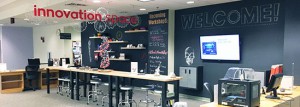The HS/HSL public computers will not be available for use from 6AM – 9AM on Wednesday, April 20th to allow for an update and maintenance. We apologize for the inconvenience.
Public Computers Unavailable Wed. April 20th, 6AM – 9AM
Notable Tech Trends: Cybersecurity, Digital Privacy, and Online Surveillance

Cybersecurity is an interesting and important topic, one closely connected to those of digital privacy and online surveillance. Many of us know that it is difficult to keep things private on the Internet. The Internet was invented to share things with others quickly, and it excels at that job. Businesses that process transactions with customers and store the information online are responsible for keeping that information private. No one wants social security numbers, credit card information, medical history, or personal e-mails shared with the world. We expect and trust banks, online stores, and our doctor’s offices to keep our information secure and safe.
Keeping private information safe and secure is, however, a challenging task. We have all heard of security breaches at Target, Sony, the Office of Personnel Management of the U.S. federal government, and even University of Maryland at College Park. Sometimes, a data breach takes place when an institution fails to patch a hole in its network systems. Sometimes, people fall for a phishing scam, or a virus in a user’s computer infects the target system. Other times, online companies compile customer data into personal profiles. The profiles are then sold to data brokers and on into the hands of malicious hackers and criminals.
To prevent such a data breach, institutional IT staff are trained to protect their systems against vulnerabilities and intrusion attempts. Employees and end users are educated to be careful about dealing with institutional or customers’ data. There are systematic measures that organizations can implement such as two-factor authentication, stringent password requirements, and locking accounts after a certain number of failed login attempts.
While these measures strengthen an institution’s defense against cyberattacks, they may negatively affect the usability of the system, lowering users’ productivity. Security is important, but users also want to be able to do their job without being bogged down by unwieldy cybersecurity measures. The more user-friendly and the simpler the cybersecurity guidelines are to follow, the more users will observe them, thereby resulting in a secure system. Users who encounter cumbersome and complicated security measures, may ignore or try to bypass them, increasing security risks.
Usability and productivity may be a small issue, however, compared to the risk of mass surveillance resulting from aggressive security measures. In 2013, the Guardianreported that the communication records of millions of people were being collected by the National Security Agency (NSA) in bulk, regardless of suspicion of wrongdoing. A secret court order prohibited Verizon from disclosing the NSA’s information request. After a cyberattack against the University of California at Los Angeles, the University of California system installed a device that is capable of capturing, analyzing, and storing all network traffic to and from the campus for over 30 days. This security monitoring was implemented secretly without consulting or notifying the faculty and those who would be subject to the monitoring. The San Francisco Chronicle reported the IT staff who installed the system were given strict instructions not to reveal it was taking place. Selected committee members on the campus were told to keep this information to themselves.
The invasion of privacy and the lack of transparency in these network monitoring programs has caused great controversy. Such wide and indiscriminate monitoring programs must have a very good justification and offer clear answers to vital questions regarding what exactly will be collected, who will have access to the information, when and how the information will be used, what controls will be put in place to prevent information from being used for unrelated purposes, and how the information will be disposed of.
Because security is essential to privacy, it is ironic that certain cybersecurity measures can be used to greatly invade privacy rather than protect it. Because we do not always fully understand how the technology actually works or how it can be exploited for both good and bad purposes, we need to be careful about giving blank permission to any party to access, collect, and use our private data without clear understanding, oversight, and consent. As we share more and more information online, cyberattacks will only increase, and organizations and the government will struggle even more to balance privacy concerns with security issues.
New Additions to the Innovation Space

The HS/HSL Innovation Space recently added two new tools to its suite of resources available to patrons. The NextEngine 3D scanner is a state-of-the-art laser scanner capable of producing high definition digital models of physical objects. The scanner can be used on the desktop to capture smaller objects or mounted onto a tripod for scanning larger objects. Our NextEngine guide provides step-by-step scanning instructions and links to further resources.
The Lulzbot Taz 5 is our most robust 3D printer yet. The Taz 5 offers the largest printing volume of our three printers. It’s also able to print various types of filament, from the conventional plastics (ABS and PLA) to hybrid filaments that contain wood, bamboo, bronze, and more. OurTaz 5 guide provides step-by-step printing instructions and links to further resources.
Stop by the Innovation Space on your next library visit to check out our new equipment!
Off-Site Library Access to Students Restored
Campus IT has fixed the coding problem that was preventing some students from accessing library journals and databases from off-campus. If you are still having an issue, please contact the IT Help Desk at 410-706-4357 or help@umaryland.edu.
Off-Site Access to Library Resources Unavailable for Some Students
If you have registered for Fall 2016 classes you may not be able to access library resources including journals and databases off-campus. Campus IT is working to fix the coding error that is causing the problem. Please contact the IT Help Desk at help@umaryland.edu or 410-706-4357 for immediate assistance.
Access to Catalog and Databases Restored
Due to a power failure at College Park, the HS/HSL temporarily lost access to the library catalog and databases. The power and access have been restored.
Access to Library Catalog and Databases Unavailable
Due to technical issues, access to library resources including the catalog, journals page and databases is currently unavailable. We are working to resolve this and hope access will be available as soon as possible.
“And there’s the humor of it”: Shakespeare and the Four Humors Exhibit at the HS/HSL
An exhibition developed and produced by the Exhibition Program at the National Library of Medicine and the Folger Shakespeare Library will be displayed in the HS/HSL Weise Gallery from April 4 through May 14, 2016.
“And there’s the humor of it”: Shakespeare and the Four Humors explores the role played by the four humors in several of Shakespeare’s most beloved plays through beautiful imagery and rare books from both the National Library of Medicine and the Folger Shakespeare Library, and examines more modern interpretations of the four humors in contemporary medicine.
Access to Library Resources Restored
Access to the HS/HSL’s databases, journals, and catalog has been restored.
Access to Catalog and Databases Restored
Due to a power failure at College Park, the HS/HSL temporarily lost access to the library catalog and databases. The power and access have been restored.

